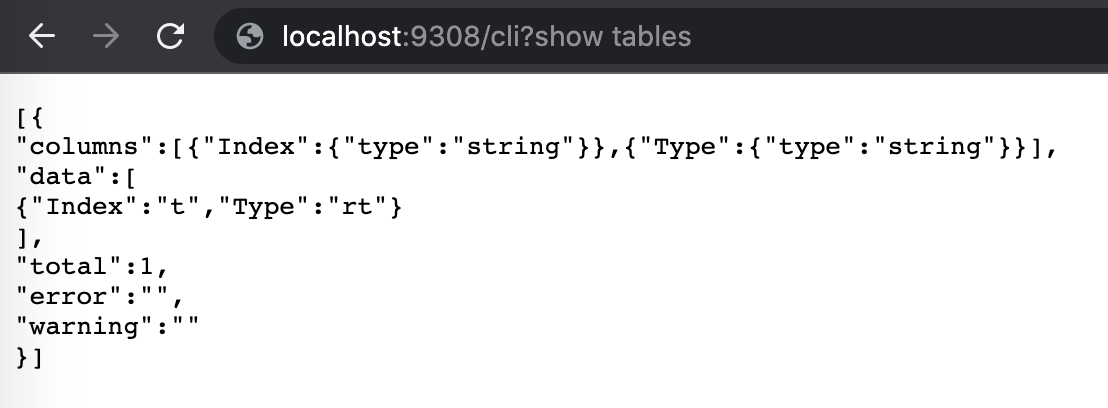You can connect to Manticore Search over HTTP/HTTPS.
By default Manticore listens for HTTP, HTTPS and binary requests on ports 9308 and 9312.
In section "searchd" of your configuration file the HTTP port can be defined with directive listen like this:
Both lines are valid and equal by meaning (except for the port number), they both define listeners that will serve all api/http/https protocols. There are no special requirements and any HTTP client can be used to connect to Manticore.
- HTTP
searchd {
...
listen = 127.0.0.1:9308
listen = 127.0.0.1:9312:http
...
}All HTTP endpoints respond with application/json content type. Most endpoints use JSON payload for requests, however there are some exceptions that use NDJSON or simple URL encoded payload.
There is no user authentication implemented at the moment, so make sure the HTTP interface is not reachable by anyone outside your network. Since Manticore acts like any other web server, you can use a reverse proxy like Nginx to add HTTP authentication or caching.
The HTTP protocol also supports SSL encryption:
If you specify :https instead of :http only secured connections will be accepted. Otherwise in case of no valid key/certificate provided, but the client trying to connect via https - the connection will be dropped. If you make not HTTPS, but an HTTP request to 9443 it will respond with HTTP code 400.
- HTTPS
searchd {
...
listen = 127.0.0.1:9308
listen = 127.0.0.1:9443:https
...
}Separate HTTP interface can be used to perform 'VIP' connections. A connection in this case bypasses a thread pool and always forcibly creates a new dedicated thread. That's useful for managing Manticore Search in case of a severe overload when the server would either stall or not let you connect via a regular port otherwise.
Read more about listen in this section.
- VIP
searchd {
...
listen = 127.0.0.1:9308
listen = 127.0.0.1:9318:_vip
...
}Endpoints /sql and /cli allow running SQL queries via HTTP.
/sqlaccepts only SELECTs and returns response in HTTP JSON format. Parameterqueryshould be url-encoded./sql?mode=rawaccepts any SQL query and returns response in raw format similar to what you get via mysql. Parameterqueryshould be url-encoded./cliaccepts any SQL query and returns response in raw format similar to what you get via mysql. The query should not be url-encoded. This endpoint is to be used for doing manual actions via browser or command line http clients likecurl.
/sql accepts an SQL SELECT query via HTTP JSON interface.
Query payload must be URL encoded, otherwise query statements with = (filtering or setting options) will result in an error.
It returns a JSON response which contains hits information and execution time. The response has the same format as json/search endpoint. Note, that /sql endpoint supports only single search requests. If you are looking for processing a multi-query see below.
- HTTP
POST /sql -d "query=select id,subject,author_id from forum where match('@subject php manticore') group by author_id order by id desc limit 0,5"{
"took":10,
"timed_out": false,
"hits":
{
"total": 2,
"hits":
[
{
"_id": "1",
"_score": 1,
"_source": { "gid": 11 }
},
{
"_id": "2",
"_score": 1,
"_source": { "gid": 12 }
}
]
}
}/sql endpoint also has a special mode "raw", which allows to send any valid sphinxql queries including multi-queries. The returned value is a json array of one or more result sets.
- HTTP
POST /sql?mode=raw -d "query=desc%20test"[
{
"columns": [
{
"Field": {
"type": "string"
}
},
{
"Type": {
"type": "string"
}
},
{
"Properties": {
"type": "string"
}
}
],
"data": [
{
"Field": "id",
"Type": "bigint",
"Properties": ""
},
{
"Field": "title",
"Type": "text",
"Properties": "indexed"
},
{
"Field": "gid",
"Type": "uint",
"Properties": ""
},
{
"Field": "title",
"Type": "string",
"Properties": ""
},
{
"Field": "j",
"Type": "json",
"Properties": ""
},
{
"Field": "new1",
"Type": "uint",
"Properties": ""
}
],
"total": 6,
"error": "",
"warning": ""
}
]While the /sql endpoint is useful to control Manticore programmatically from your application, there's also endpoint /cli which makes it eaiser to maintain a Manticore instance via curl or your browser manually. It accepts POST and GET HTTP methods. Everything after /cli? is taken by Manticore as is even if you don't escape it manually via curl or let the browser encode it automaticaly. The + sign is not decoded to space as well, eliminating the necessity of encoding it. The response format is the same as in the /sql?mode=raw.
- HTTP
- Browser
POST /cli -d "select id,1+2 as a, packedfactors() from test where match('tes*') option ranker=expr('1')"[
{
"columns": [
{
"id": {
"type": "long long"
}
},
{
"a": {
"type": "long"
}
},
{
"packedfactors()": {
"type": "string"
}
}
],
"data": [
{
"id": 1,
"a": 3,
"packedfactors()": "bm25=616, bm25a=0.69689077, field_mask=1, doc_word_count=1, field0=(lcs=1, hit_count=1, word_count=1, tf_idf=0.25595802, min_idf=0.25595802, max_idf=0.25595802, sum_idf=0.25595802, min_hit_pos=1, min_best_span_pos=1, exact_hit=0, max_window_hits=1, min_gaps=0, exact_order=1, lccs=1, wlccs=0.25595802, atc=0.000000), word0=(tf=1, idf=0.25595802)"
},
{
"id": 2,
"a": 3,
"packedfactors()": "bm25=616, bm25a=0.69689077, field_mask=1, doc_word_count=1, field0=(lcs=1, hit_count=1, word_count=1, tf_idf=0.25595802, min_idf=0.25595802, max_idf=0.25595802, sum_idf=0.25595802, min_hit_pos=1, min_best_span_pos=1, exact_hit=0, max_window_hits=1, min_gaps=0, exact_order=1, lccs=1, wlccs=0.25595802, atc=0.000000), word0=(tf=1, idf=0.25595802)"
},
{
"id": 8,
"a": 3,
"packedfactors()": "bm25=616, bm25a=0.69689077, field_mask=1, doc_word_count=1, field0=(lcs=1, hit_count=1, word_count=1, tf_idf=0.25595802, min_idf=0.25595802, max_idf=0.25595802, sum_idf=0.25595802, min_hit_pos=2, min_best_span_pos=2, exact_hit=0, max_window_hits=1, min_gaps=0, exact_order=1, lccs=1, wlccs=0.25595802, atc=0.000000), word0=(tf=1, idf=0.25595802)"
}
],
"total": 3,
"error": "",
"warning": ""
}
]HTTP keep-alive is also supported, which makes working via the HTTP JSON interface stateful as long as the client supports keep-alive too. For example, using the new /cli endpoint you can call SHOW META after SELECT and it will work the same way it works via mysql.
